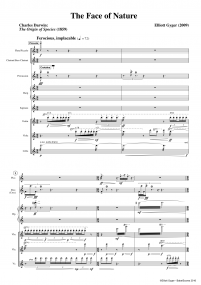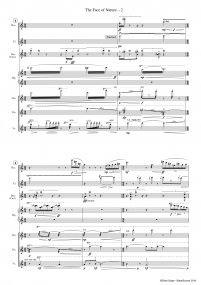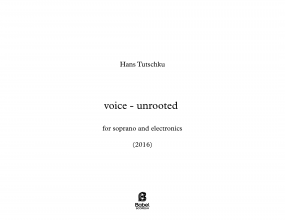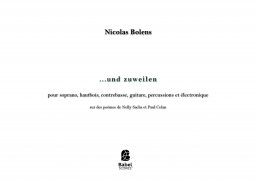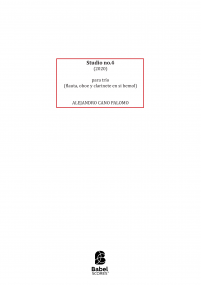The Face of Nature
for soprano and ensemble
11,33 €
Digital version (+0,00 €) instant download
Printed format (+14,80 € printing and shipping). Colissimo7-14 days aprox.
When you buy a score, you can contact the composer right here!
Specifications
Region
Oceania
Estimated Duration
6 - 10min
Date
2009
ISMN : 979-0-2325-1796-4
In Stock
Notes on this piece The Face of Nature sets a couple of passages from the third chapter of The Origin of Species, elaborating one of Darwin's most compelling metaphors. When the natural world is viewed at a distance, it appears orderly, bountiful and even harmonious, but this order and balance is the composite result of countless acts of violence and destruction – like a "yielding surface, with ten thousand sharp wedges packed close together". My musical setting attempts to create an analogous musical metaphor, in a texture which appears to shift perspective between sonorous lushness and percussive, pointillist fragmentation. Serving as opposing points of reference are two complex harmonies: a resonant sonority built on the overtone series of a low bass clarinet B flat, and the inversion of the same structure as an “undertone series” supporting a top C on the crotales.
The piece falls into two distinct sections. In the first, the ensemble is a hive of feverish activity, in which the various instruments sometimes blur, and at other times emerge as individual characters, the voice, initially a detached observer, is subsequently drawn into the fray. The second section brings the whole ensemble together as a single entity – articulating a succession of wide-spaced, percussive chords – while the soprano part becomes polyphonic, creating multiple perspectives by cross-cutting between splintered fragments of text.
Add to a playlist
- Login to create your own lists
The piece falls into two distinct sections. In the first, the ensemble is a hive of feverish activity, in which the various instruments sometimes blur, and at other times emerge as individual characters, the voice, initially a detached observer, is subsequently drawn into the fray. The second section brings the whole ensemble together as a single entity – articulating a succession of wide-spaced, percussive chords – while the soprano part becomes polyphonic, creating multiple perspectives by cross-cutting between splintered fragments of text.
Instrumentation
Soprano voice|Flute|Clarinet|Percussions|harp|violin|Viola|Cello
Score Details
Format - A4 / US Letter
Pages - 52
Pages - 52


